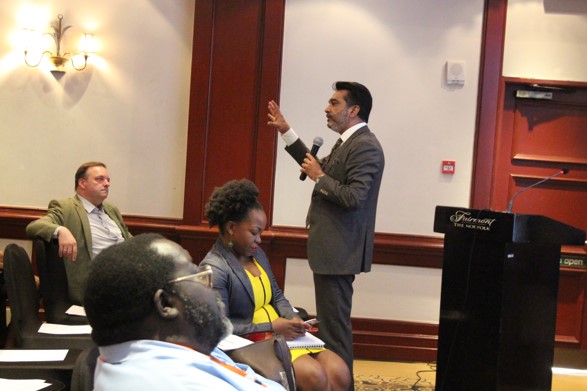Finland explores business opportunities in the Kenya Health Sector
Kenya Healthcare Federation (KHF) held the 5th Bi-Monthly members meeting at the Fairmont Norfolk hotel in Nairobi. The meeting which was held in 2 parts – networking forum with Team Finland, and members meeting, was sponsored by Team Finland who had visited Kenya to discuss business opportunities. Team Finland is a network of public service providers providing internationalization services for companies. The network seeks to provide companies with a smooth service chain from counseling to finance. The main sectors of business focus for the Team Finland delegation were; Education, Energy and Health. The Finland business delegation on health and health education included Perkinelmer Wallac, Vamed Company, Logonet Group, Oulu University of applied sciences and Tampere University of applied science. They were open for partnerships that would help address issues of access and quality of healthcare.
In his opening remarks at the networking forum, Dr. Amit Thakker, KEPSA health sector board and KHF chair stated that the private sector provides 50% of medical services in Kenya. He further added that KHF provides a platform to examine Kenya’s health landscape and identify the type of partnerships that will promote trade and investment in Kenya. Affordable Healthcare for all being one of H.E. President Uhuru Kenyatta’s BIG 4 Agenda, the socio-economic agenda comes at an opportune time in Kenya where the county and national governments are appreciating the inclusion of the private sector. The key opportunities that will require beneficial, cross-cutting resolutions and partnerships include supply chain, local manufacturing and technology These areas offer opportunities for innovations to increase quality and reduce cost of health care.

Dr. Thakker then chaired the members meeting that brought together 50 members. Dr. Elizabeth Wala, KHF Vice Chair, took the members through the KHF strategic plan 2018-2020 which focuses on an increased level of advocacy, public-private partnerships, networking and regional integration. Reflecting on the previous term 2015 – 2017, she noted that there has been remarkable achievements in the membership growth (96%), that KHF has managed to hold fruitful engagements with county health stakeholders, and that through the regular ministerial stakeholders forum (MSF) KHF has managed to get a favorable ruling on the importation of medical equipment and commodities. KHF through the same forum is advocating for policy decisions to promote local pharmaceutical and medical devices manufacturing with the aim of reducing cost of healthcare.
In the strategic plan 2018-2020, the federation through it’s advocacy role will ensure that the under privileged, elderly and marginalized are considered in the national health insurance. KHF will continue to play an advisory role to the Ministry of Health on better health financing models. In line with the BIG 4 Agenda, KHF will ensure that it’s communication and publications will provide expertise on issues affecting the health sector especially where affordability, accessibility and quality of care is concerned. KHF will strengthen it’s partnership with the counties through county health stakeholders engagements to ensure quality is enhanced in health facilities.
Dr. Thakker took the members through the discussion points of the upcoming presidential round table (PRT) which will be focusing on “Closing the gap to the BIG 4 Agenda for Universal Health Coverage.” He informed the members that the private health sector will participate in the following areas: provision of health services, supply chain, technology, innovations and healthcare financing. Some of the key pain points that will be discussed include; high input cost of providing medical care, inefficient use of health infrastructure, shortage of human resources for health, multiple fees, charges and taxes, high cost of medical products and supplies, counterfeits, tax burden, irregular parallel imports, fragmentation of the health sector, poor information sharing, lack of enabling regulation to support innovation in health, delayed NHIF accreditation/ reimbursements, legislated NHIF monopoly, unfavorable laws, lack of overarching regulations for health insurance, sustainability for UHC and ensuring coverage for the poor.
